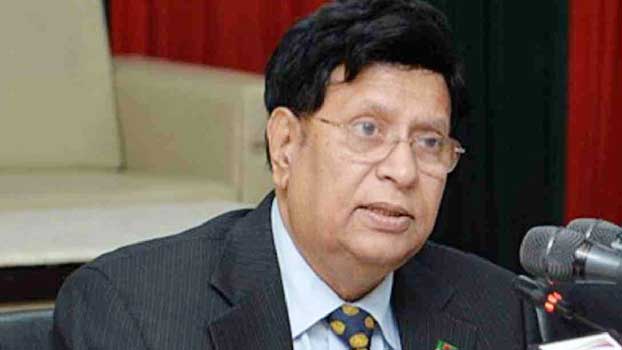World needs joint efforts to tackle 2nd virus wave: FM

Foreign Minister Dr AK Abdul Momen on Saturday called upon all to emulate Prophet Hazrat Muhammad (PBUH) in daily lives and said the world needs collective actions to win the fight against the second upsurge of the Covid-19 pandemic.
“The Covid-19 pandemic has pulled us into an extraordinary situation. We as Muslims, owe a duty of care to all human beings,” he said while speaking at the ‘Scholarly Conclave on the occasion of celebration of the birth anniversary, Eid-e-Miladunnabi of Prophet Hazrat Muhammad (PBUH)’ on Saturday.
The foreign minister shared a story of the Prophet and said: “He had a neighbour of a different faith who was unceasingly ill-tempered. She once fell ill, and hearing that news, our prophet went and visited her and prayed for her. Brothers and sisters, this is what we need now -the compassion, the kindness, the solidarity”.
“We must not forget that unity is our strength, and our strength will lead to our ultimate victory,” he said. “We must illuminate the sense of belongingness, empathy and kind-heartedness, that our prophet did. True to this spirit, I would request the business community to enhance its constructive and result oriented engagements with the governments in response and recovery phases.”
The apex business chamber, FBCCI, organised the event with its President Sheikh Fazle Fahim in chair. The Indonesian Chamber of Commerce and Industry or KADIN, Nigerian Association of Chambers of Commerce, Industry, Mines and Agriculture; and the Union of Chambers and Commodity Exchanges of Turkey were also part of the event.
The foreign minister urged all “to redouble efforts to banish hatred and conflict from the earth, while spreading the message of solidarity, love, peace and tolerance among all humankind.”
“Islam is the religion that carries the essence of peace and harmony. Our prophet’s life and teachings are the best source for learning, realizing and practicing Islam. His teachings encompass all aspects of life, work, living and human dealings, which are suitable everywhere, every time.
“He leads by example, by demonstrating to us how to build an inclusive, tolerable and peaceful society for the welfare of humanity. Therefore, we are not only celebrating the occasion of the birthday of our beloved prophet today, but also reflecting on the legacy he has left behind for us. A legacy that we all can learn from, and carry on in our lives.”
The foreign minister said the present world is undergoing ‘anxious, depressed and tense situations’.
“With deep regret, we are witnessing the increasing trend of Islam phobia, coupled with manifestations and incidents of hostile, defamatory, discriminatory and racist discourse and actions against the Muslims and Islam. But, our prophet was the harbinger in showing tolerance and compassion for followers of other faiths. They were free to practice their own religions.
“When a delegation of Christians visiting from Yemen did not have a place to pray, he offered them the mosque for the purpose. He negotiated the Constitution of Madina with all the stakeholders, including Muslims and non-Muslims. The first article of the Constitution stated that the inhabitants of Madina, regardless of their religion, race and ancestry, would live in peace and harmony, and respect and protect each other’s rights,” he said.
“Whatever the issue is, I firmly believe, the related actions should inculcate the divine values of honesty, integrity, morality, tolerance and justice, as taught and practiced by our prophet. Our prophet’s treatment of women is characterised by chivalry, graciousness, modesty and respect,” he said.
“There is a significant difference between the level of science and technology at the time- when the prophet lived and our own. Despite enormous differences, he revealed a number of truths about the future, including the advancement of science and technology. He urged Muslims to acquire knowledge even if it meant travelling to China, one of the most difficult-to-reach countries in his day.
“Sustainable development is not a new concept to Islam. The Holy Quran and the Hadith provide the framework for the spiritual and physical welfare of humanity. There are over 500 verses in the Holy Quran giving us guidance on matters relating to the environment and how to deal with it. There are numerous examples from our prophet’s life and sayings, which provide a model for justice and equity.
“For instance, the prophet personally cautioned his companions to ensure the sustainable use of water resources. He said: “Do not waste water even if performing ablution on the bank of a fast-flowing large river.””
“Right from the very advent of Islam, the unfeigned significance of the economy has been emphasised by our prophet, whose first profession was trade and commerce. The prophet taught a great deal on ethical trading. He said that the best of people are those that bring most benefit to the rest of mankind.
“That is why we should always carry on the mettle that whatever business or trade we do, we must be ethical, honest and trustworthy. We must ensure the quality of our service. We must provide the best value and the optimal benefit to our clients, to our community and eventually to mankind,” the foreign minister said.
He said Prime Minister Sheikh Hasina has responded swiftly and vigorously to the pandemic, and our preparedness as a Nation, has enabled us to celebrate the momentous occasion of the Eid-e-Miladunnabi (October 29) surrounded by our families and friends.
“However, we are not complacent about the containment of the virus. Rather, we are taking due measures to tackle the second wave of the pandemic,” he said.




